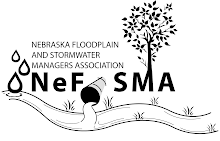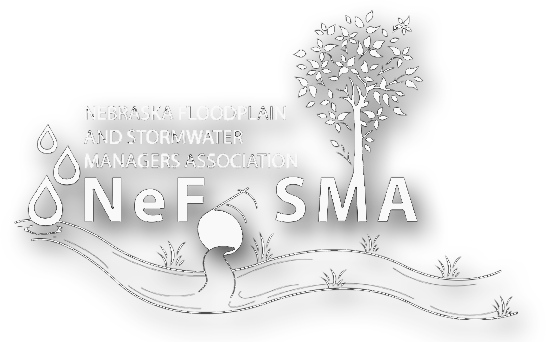In 2003, when I began doing research for my Masters Thesis in Community and Regional Planning at University of Nebraska, YouTube didn't even exist. At the time, I was exploring the best examples around the country of land development codes that supported the ideas of watershed protection. These ideas have come to be called anything from Conservation Design, Low Impact Development, Better Site Design, Green Infrastrucutre, and others. Whatever you call it in your community or professional circle, the idea is that we shed a lot of additional water from newly developed sites that the existing water resources can't keep up with. Besides the increased runoff velocity, pollutants also load these stormwater flows at increased levels that have compounding negative impacts both locally and downstream.
There are many creative ways to manage stormwater runoff within a traditional land development. NeFSMA has provided members with tours from time to time of sites around Lincoln and Omaha who have demonstrated these opportunities. UNL-Extension Stormwater Management Team is helping install rain gardens in communities across the State. Examples are growing, but a significant barrier to alternative stormwater management practices exists when we're thinking about linear roadway systems. These systems transport almost 100% of the rainfall (and related pollutants) that falls on the footprint into a collection system and downstream. That is not the barrier though. The barrier is that the public wants to keep the cost of their roadways as low as possible. Additional right-of-way for a road that gets me to school/work/play is paid for by my taxes. If you start taking more right-of-way for things like stormwater treatment that requires sophisticated maintenance, our taxes are expected to go up, with no percieved benefit by the user.
Public Works Departments aren't typically given blank checks to run out and add a bunch of features that the City Council, Mayor, or the public aren't strongly behind. And in Nebraska, I'd say from experience that although most feel "it is important" to consider the environment, they are less inclined to pay that full price-tag when it comes to stormwater management on public projects. It's just not the way municipal business has been done in the past. Change is difficult and many examples of success are going to have to be seen before a transition can be made.
NeFSMA will continue to highlight those good (and bad) examples of stormwater management on public projects. Our hope is that the barrier to responsible stormwater management can start eroding away (we'll be sure to dispose of them properly). I was pleased to see the following video from the City of Olympia, Washington which was one of my case study examples in my Thesis. If you have 10 minutes to learn about this research project, I encourage you to listen for the way information is presented. The narrator paints an honest picture of why this project even occured and what they hope to learn from it.
So what do you think? What do we need to do in Nebraska to start breaking down barriers to responsible stormwater management on public infrastructure projects? Can it be done? Does it need to be done?
Article Respectfully Submitted by Jesse Poore of Felsburg Holt & Ullevig
About Our Association

- Nebraska Floodplain and Stormwater Managers Association
- The Nebraska Floodplain and Stormwater Managers Association (NeFSMA) is an active organization of over 100 members representing over 50 organizations. NeFSMA pursues multiple purposes including: 1.)promote public awareness of floodplain and stormwater management; 2.) promote the professional status of floodplain and stormwater management and secure all benefits resulting there from; 3.) promote cooperation and information exchange between individuals and entities concerned with floodplain and stormwater management; 4.) keep individuals concerned with floodplain and stormwater management well informed through educational and professional seminars and to provide a method for dissemination of information, both general and technical; 5.) inform and educate concerned individuals of pending floodplain or stormwater legislation, funding and other related management matters. Please browse our website to learn more about NeFSMA at www.nefsma.net. If you are interested in joining, either contact one of the board members or complete the membership form.
Friday, February 4, 2011
Subscribe to:
Post Comments (Atom)

No comments:
Post a Comment